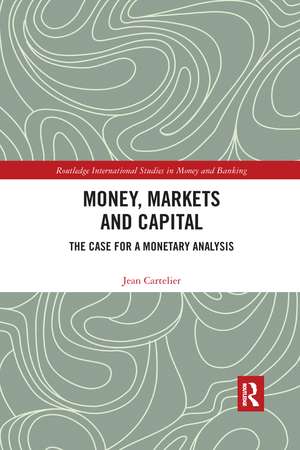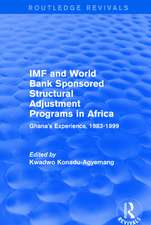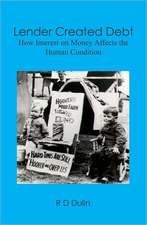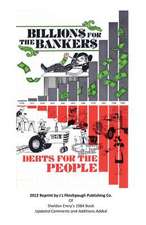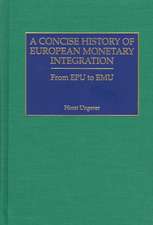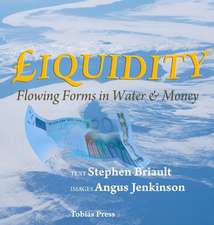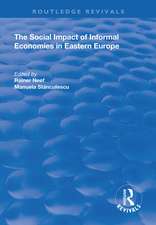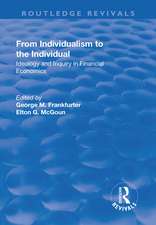Money, Markets and Capital: The Case for a Monetary Analysis: Routledge International Studies in Money and Banking
Autor Jean Cartelieren Limba Engleză Paperback – 14 aug 2020
In a first part, the author shows how fragile and shaky are the attempts made by value theoreticians to integrate money into their analysis. In a second part, he develops a rigorous alternative theory by giving strong logical foundations to a monetary analysis in the spirit of Keynes. Many important economic phenomena left unexplained by academic theory are accounted for (involuntary equilibrium unemployment), a new method in dynamics is resorted to (viability theory) and various economic relations are elucidated which are not reducible to exchange, the only one dealt with by academic theoreticians. This is the case of the wage relationship.
Although written in view of an audience acquainted with economic theory, this book can be read nevertheless by a larger circle since the technicalities have been reduced to what is strictly necessary to understand what is at stake.
Din seria Routledge International Studies in Money and Banking
-
 Preț: 309.94 lei
Preț: 309.94 lei -
 Preț: 325.16 lei
Preț: 325.16 lei -
 Preț: 284.40 lei
Preț: 284.40 lei -
 Preț: 313.60 lei
Preț: 313.60 lei -
 Preț: 311.41 lei
Preț: 311.41 lei -
 Preț: 307.47 lei
Preț: 307.47 lei -
 Preț: 313.17 lei
Preț: 313.17 lei -
 Preț: 341.57 lei
Preț: 341.57 lei -
 Preț: 309.87 lei
Preț: 309.87 lei -
 Preț: 310.84 lei
Preț: 310.84 lei - 9%
 Preț: 864.85 lei
Preț: 864.85 lei -
 Preț: 664.77 lei
Preț: 664.77 lei - 18%
 Preț: 1175.01 lei
Preț: 1175.01 lei - 18%
 Preț: 1122.64 lei
Preț: 1122.64 lei - 18%
 Preț: 1056.00 lei
Preț: 1056.00 lei - 18%
 Preț: 1067.14 lei
Preț: 1067.14 lei - 27%
 Preț: 148.98 lei
Preț: 148.98 lei - 27%
 Preț: 503.80 lei
Preț: 503.80 lei - 18%
 Preț: 1058.79 lei
Preț: 1058.79 lei - 26%
 Preț: 820.40 lei
Preț: 820.40 lei - 18%
 Preț: 1058.79 lei
Preț: 1058.79 lei - 28%
 Preț: 821.46 lei
Preț: 821.46 lei - 18%
 Preț: 1057.40 lei
Preț: 1057.40 lei - 31%
 Preț: 765.01 lei
Preț: 765.01 lei - 18%
 Preț: 1056.28 lei
Preț: 1056.28 lei - 15%
 Preț: 254.03 lei
Preț: 254.03 lei - 18%
 Preț: 1064.70 lei
Preț: 1064.70 lei - 18%
 Preț: 1113.25 lei
Preț: 1113.25 lei - 18%
 Preț: 702.31 lei
Preț: 702.31 lei - 18%
 Preț: 1166.68 lei
Preț: 1166.68 lei - 30%
 Preț: 849.37 lei
Preț: 849.37 lei - 18%
 Preț: 1116.38 lei
Preț: 1116.38 lei - 30%
 Preț: 851.99 lei
Preț: 851.99 lei - 18%
 Preț: 1060.87 lei
Preț: 1060.87 lei - 28%
 Preț: 823.57 lei
Preț: 823.57 lei - 18%
 Preț: 1114.70 lei
Preț: 1114.70 lei - 25%
 Preț: 824.53 lei
Preț: 824.53 lei - 29%
 Preț: 1188.26 lei
Preț: 1188.26 lei - 28%
 Preț: 853.07 lei
Preț: 853.07 lei - 18%
 Preț: 1114.30 lei
Preț: 1114.30 lei -
 Preț: 418.22 lei
Preț: 418.22 lei - 30%
 Preț: 854.10 lei
Preț: 854.10 lei - 18%
 Preț: 1060.25 lei
Preț: 1060.25 lei - 18%
 Preț: 1165.73 lei
Preț: 1165.73 lei - 18%
 Preț: 1056.00 lei
Preț: 1056.00 lei - 30%
 Preț: 851.82 lei
Preț: 851.82 lei - 18%
 Preț: 1059.48 lei
Preț: 1059.48 lei - 18%
 Preț: 1240.95 lei
Preț: 1240.95 lei - 29%
 Preț: 1187.46 lei
Preț: 1187.46 lei
Preț: 386.81 lei
Nou
Puncte Express: 580
Preț estimativ în valută:
74.03€ • 79.91$ • 62.08£
74.03€ • 79.91$ • 62.08£
Carte tipărită la comandă
Livrare economică 19 aprilie-03 mai
Preluare comenzi: 021 569.72.76
Specificații
ISBN-13: 9780367591175
ISBN-10: 0367591170
Pagini: 250
Dimensiuni: 156 x 234 x 15 mm
Greutate: 0.39 kg
Ediția:1
Editura: Taylor & Francis
Colecția Routledge
Seria Routledge International Studies in Money and Banking
Locul publicării:Oxford, United Kingdom
ISBN-10: 0367591170
Pagini: 250
Dimensiuni: 156 x 234 x 15 mm
Greutate: 0.39 kg
Ediția:1
Editura: Taylor & Francis
Colecția Routledge
Seria Routledge International Studies in Money and Banking
Locul publicării:Oxford, United Kingdom
Public țintă
Postgraduate and UndergraduateCuprins
List of Figures; List of Tables; List of Schemas; Introduction; Part I. Money in value theory; Chapter 1: A bird-eye’s view; Chapter 2: Integration of money into value theory and neutrality in a nutshell; The problem of integration; Neutrality of money: the Grail of money theory?; Chapter 3: Money: fiat money or social device for coordination?; The essence of money; The incentives for going beyond academic theory; Part II. The case for a monetary analysis; Chapter 4: Primitives of a monetary analysis; The fundamental postulates; Money and accounts: a close connexion; The minting process, a crucial element of a monetary economy; Chapter 5: A pure market economy: exchange relations; A market economy: main characteristics; Some propositions; The dynamics of market relations; Chapter 6: Entrepreneurs, wage-earners and capitalists; The rationale for the differentiation of entrepreneurs and wage-earners; Specific properties of an entrepreneur economy Erreur ! Signet non défini.; The level of activity: a crucial point; Appendix; Chapter 7: Some specific properties of a capitalist economy; Kalecki principle; Involuntary unemployment steady-states: Solow as a special case of a monetary analysis; Disequilibrium dynamics: Harrod’s razor-edge; From entrepreneur economy to finance; Appendix; Conclusion; Some advances of the present essay; Legal money; Out-of-equilibrium situations; Involuntary unemployment equilibria and foundations for Keynes economics; Economics and the plurality of social disciplines: a suggested interpretation; Money mediation as a self-referential system amongst others; Self-referential systems and complexity; References; Index
Notă biografică
Jean Cartelier is Professor Emeritus at Paris Nanterre University. His main fields of interest are general economics, money theory and history of economic thought.
Descriere
As a result of the 2008 global financial crisis, economists shifted their emphasis from economic policy and social governance to theoretical debates. Economists should reconsider the state of their discipline to avoid taking a step backward and it seems more appropriate than ever to think about the way economic theory has evolved and to check it
